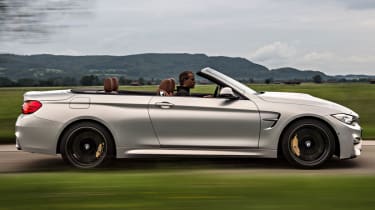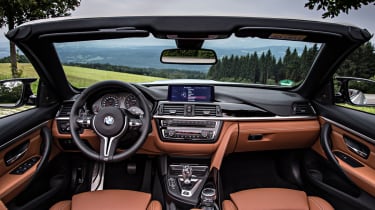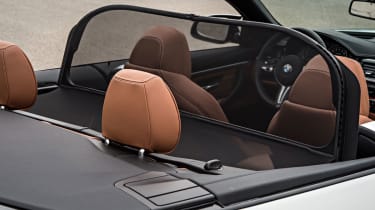BMW M4 Convertible review (2014-2020)
"Despite the extra weight compared to the coupe, the BMW M4 convertible is still enormous fun to drive"
Pros
- Impressive automatic gearbox
- Comfortable and fast
- Great to drive
Cons
- Reduced boot space
- Rear seats aren't very big
- Heavier than coupe version
The BMW M4 Convertible has the same 3.0-litre twin-turbo petrol engine as the M4 Coupe, making it an extremely fast four-seater convertible. As well as offering superb handling and muscular styling, the car is refined and plush on the inside.
One of the drawbacks of the convertible version (other than a higher price) is a folding roof that makes it heavier than the coupe, compromising handling and fuel economy slighly. The roof also affects the car's practicality by cutting into boot space.
Few owners will mind, however. The M4 Convertible looks fantastic and is a hugely capable, well rounded open-top sports car that can be both blisteringly quick and very comfortable thanks to its standard adjustable suspension.
MPG, running costs & CO2
The BMW M4 convertible is 178kg heavier than the M4 coupe, making it slightly more expensive to run. If you choose the optional dual-clutch gearbox – and most buyers will – fuel economy falls from 34mpg in the coupe to 32.1mpg. Emissions also increase slightly from 190g/km to 202g/km, while models equipped with the manual gearbox are a bit less efficient, too.
Bearing in mind the fact that the M4 convertible is a sports car, those official mpg figures are a good bit off what you're likely to see in the real world. In order to get anywhere near those figures, you'd have to drive it like a saint, which will be hard work in a car such as this.
Due to the fact it costs more than £40,000, BMW M4 Convertibles registered after 1 April 2017 will cost £450 a year to tax, though after the first five years the road tax bill will drop to £140.
As a high-performance machine, the M4 convertible will inevitably be expensive to insure – but it should actually be cheaper to cover than an Audi RS5 Cabriolet. Servicing costs can be paid up-front – a £1,000 deal covers all costs for five years. Pay £3,460 and that deal is upgraded to include wear-and-tear items such as brake discs and pads.
Engines, drive & performance
Power comes from the same 3.0-litre twin-turbo six-cylinder engine used in the BMW M4 coupe and BMW M3 saloon. It produces 425bhp and takes the convertible from 0-62mph in 4.4 seconds. That’s three tenths of a second slower than the hard-top car, due to the 178kg weight of the roof mechanism and some strengthening in the chassis to compensate for the lack of a fixed roof.
The M4 convertible is still a quick car, though, as its low-end and mid-range power is smooth and always available. What has changed about the power delivery is the throttle response: it isn't quite as sharp as the M3 convertible it replaced.
With the roof up, the engine sounds a little bit artificial (BMW has fitted a system that channels engine noise through the stereo to improve the engine’s overall sound) but with the roof down it’s much more natural. The engine growls and crackles, making you wish you could keep the top lowered all the time.
With the extra weight on board, the M4 Convertible doesn’t seem quite as quick to stop as the coupe when you brake hard, and it can’t quite match the hard-top car in bends, either. Nevertheless, we think the M4 is the best four-seater convertible on the market for driving enthusiasts and as an overall proposition the car is certainly more refined.
Interior & comfort
The seats in the BMW M4 are very good, managing to be both supportive and comfortable. Though the suspension is sportier than in the standard 4 Series, it's adjustable, so you can select a comfort setting for more relaxed cruising. We'd avoid the bigger alloy wheels, as the standard 19-inch versions look great without making the ride too bumpy.
Compared to the coupe, the body of the convertible isn’t quite as stable or rigid, so it moves a little bit more when you hit bumps and potholes. This doesn’t really spoil the driving experience, but you'll notice it if you test-drive the coupe first.
Roof-down driving is pretty good with the windows up and the wind deflector in place. You don’t need to worry about your hair getting messed up, even if you’re travelling at 70mph.
In terms of interior kit, BMW's infotainment system is incredibly easy to use. The dial used to scroll through menus is responsive and the widescreen display is clear and easy to read. Standard from 2018, BMW's 'remote services' also allow you to keep an eye on your car using a smartphone app, lock and unlock its doors, set its climate control and even flash the headlights.
The seats for all occupants are incredibly supportive, especially when hard cornering is involved. Supportive doesn't mean uncomfortable, though: long road trips suit the M4 convertible well and passenger comfort remains very good.
Practicality & boot space
The BMW M4 convertible is a four-seater, and although there's just enough room for adults in the back seats, it’s better to think of it as a two-seater if you plan on driving with the top down very often. That’s because you can fit a wind deflector across the back seats that allows you to travel at motorway speeds with practically no buffeting. Without it, the experience is pretty blustery for all passengers. Headroom may be an issue for those over six feet with the roof up, but that issue will obviously vanish when the roof is retracted.
The boot has 370 litres of space, which is slightly less than the 445 litres offered in the coupe. In reality, there's enough room for at least four weekend bags – but only with the roof up. If you put it down, the available space decreases to just 200 litres and it becomes difficult to access your luggage. Thankfully, BMW has fitted a system that electronically lifts the folded roof up slightly so you can pull your bags out more easily.
Reliability & safety
The BMW M4 is based on the BMW 4 Series, which did very well indeed in our 2016 Driver Power customer satisfaction survey, coming 15th out of 150 cars. While neither the M4 nor the 4 Series has been put through the Euro NCAP crash-test programme, the mechanically similar 3 Series saloon scored a full five-star rating when it was tested in 2012, and it seems likely the M4 would get a similar score.
A range of safety technology is available, including an optional dynamic safety system that detects signs of tiredness and can prepare the car for a potential crash by tensing the seatbelts, closing the windows and returning seats to their optimal position to prevent injuries.















